Overview
The article "10 Benefits of Assisted Living for Autistic Adults" sheds light on the profound advantages that assisted living can offer to autistic individuals. It emphasizes the importance of enhanced independence, social engagement, and personalized support.
By highlighting tailored care plans and community-building initiatives, the article illustrates how these elements not only improve the quality of life for autistic adults but also nurture their emotional well-being and independence.
Ultimately, this makes assisted living a valuable option for this population, fostering a sense of belonging and support that is essential for their growth and happiness.
Introduction
In a world where the prevalence of autism is on the rise, the urgency for effective support systems has never been more pronounced. Assisted living facilities are stepping up to meet this critical demand by providing tailored resources that empower autistic individuals and their families. These environments offer personalized care plans designed to enhance independence, alongside vibrant community engagement that fosters meaningful social connections.
By addressing essential factors such as safety, emotional well-being, and holistic health, assisted living not only supports individuals with autism but also grants families peace of mind. This article explores the multifaceted benefits of assisted living for autistic adults, illustrating how these facilities create supportive, empowering spaces that enhance quality of life and promote independence.
About ASD Media: Comprehensive Resources for Autism Support
At ASD Media, we are deeply committed to advancing the implementation of Applied Behavior Analysis (ABA) therapy. We understand the challenges that families face and strive to offer valuable insights and strategies to help navigate these difficulties and improve outcomes. With the prevalence of autism rising to 1 in 54 children by 2020, the need for effective support has never been more critical. We recognize that the success of therapies often hinges on the child's specific needs and the timing of the intervention; earlier support generally leads to better long-term outcomes.
To assist parents and professionals, ASD Media provides a comprehensive array of resources tailored to their unique situations. We emphasize that early and consistent interventions are crucial in effectively managing autism. By subscribing to our newsletter, you gain access to the latest news and unlimited digital resources, empowering you to unlock the potential of children with autism and ADHD.
Moreover, we acknowledge the importance of addressing challenges in autism therapy, such as supply-demand discrepancies and racial disparities. These issues require collaboration among policymakers, healthcare providers, and communities. Our dedication to community development and resource sharing is vital for increasing the effectiveness of autism interventions and enhancing overall results for individuals with ASD. We also recognize the necessity for customized programs that address gender disparities in autism diagnosis, ensuring that every child receives the support they deserve.
Independence: Empowering Autistic Adults Through Assisted Living
Assisted living for autistic adults creates a nurturing environment that significantly enhances independence for these individuals. By implementing personalized care plans tailored to specific needs, these facilities empower residents to make informed choices about their daily activities. This empowerment is crucial for fostering independence, which in turn boosts self-esteem and personal development.
It's concerning that studies reveal 26% of young individuals on the spectrum lack access to essential services, such as employment and educational assistance, that support their transition to independence. This highlights the importance of these resources in bridging the gap. Furthermore, specialists emphasize that independence is closely linked to self-worth in individuals with autism, reinforcing the idea that supported living can be transformative.
Maintaining psychophysical stability—mental and physical wellness—is vital for individuals with autism to handle daily tasks and responsibilities independently. Through developing life skills and gaining confidence in social interactions, residents often feel better equipped to navigate the complexities of everyday life.
Successful case studies, including insights from 'Unraveling the Autism Epidemic,' illustrate how personalized care plans not only enhance the quality of life for autistic adults but also promote their independence, making assisted living for autistic adults a valuable option for those aspiring to thrive in their communities. Additionally, understanding patient rights and responsibilities within these facilities empowers residents, ensuring they have a voice in their care and housing arrangements.
Social Engagement: Enhancing Connections in Assisted Living Environments
Assisted living environments are thoughtfully designed to nurture social interaction among residents, fostering a vibrant community where connections can thrive. Engaging activities such as group outings, game nights, and communal dining not only promote friendships but are also vital for emotional well-being. Research shows that the odds ratio for young individuals with autism spectrum disorder (ASD) never being invited to activities stands at 0.8, highlighting the urgent need for structured social opportunities. These interactions play a crucial role in alleviating feelings of isolation and loneliness, enabling individuals on the spectrum to cultivate meaningful relationships that enhance their overall quality of life.
Moreover, successful community-building initiatives in assisted care settings have revealed that communal activities positively impact emotional well-being, underscoring the importance of social connections in these environments. As noted by DJM in a research project backed by the Oklahoma Center for the Advancement of Science and Technology, fostering social engagement is essential for improving the quality of life for individuals in assisted living for autistic adults. Additionally, the case study titled 'Focus on Adolescence and Emerging Adulthood' emphasizes the critical role of social inclusion during these developmental years, further highlighting how assisted living for autistic adults can aid individuals with autism.
By prioritizing social interaction, assisted living for autistic adults can create nurturing environments that empower individuals on the spectrum to flourish. Let us work together to ensure that everyone has the opportunity to connect and thrive in their communities.
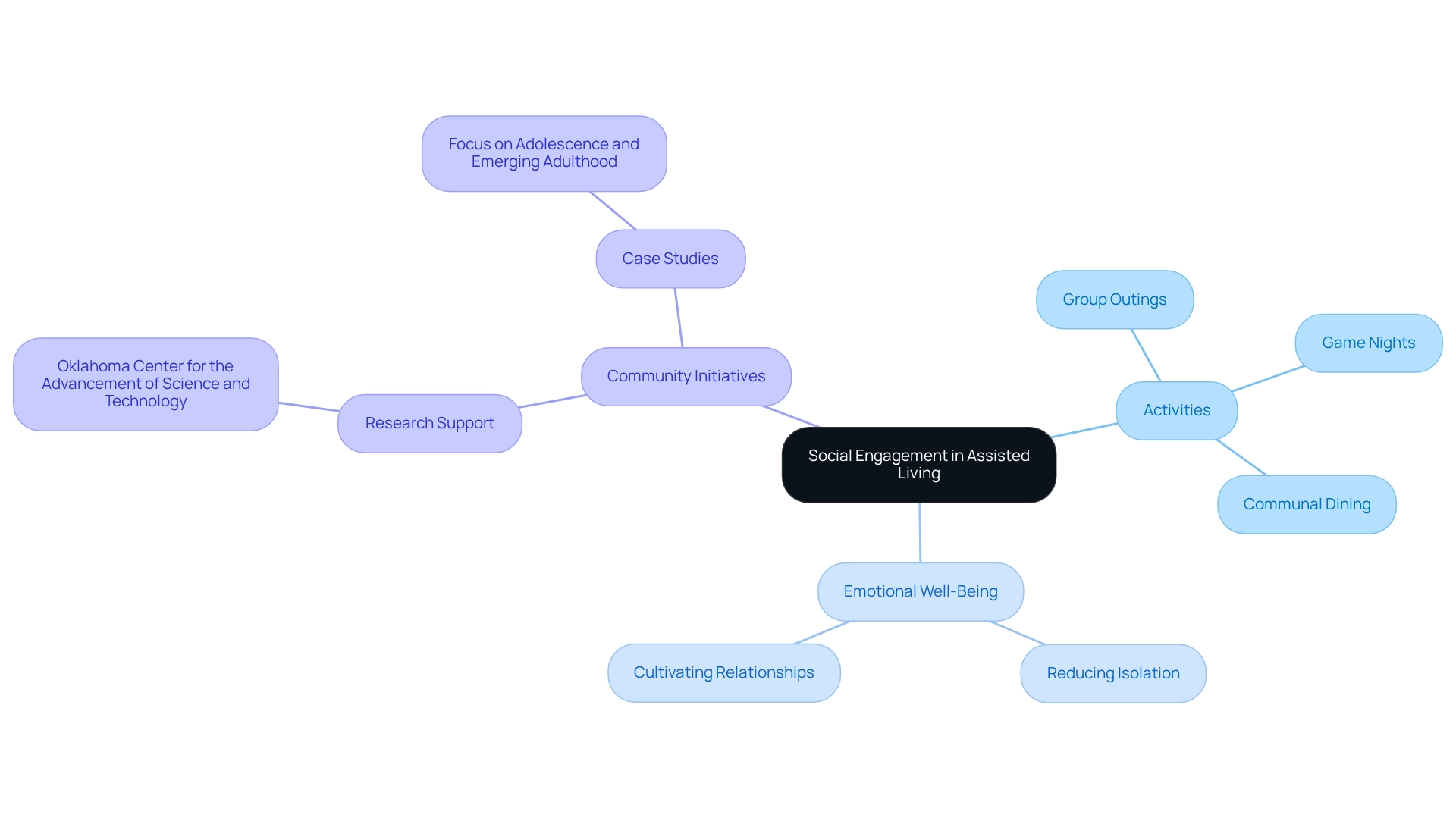
Cost-Effectiveness: Financial Benefits of Assisted Living for Families
Assisted living for autistic adults presents a financially sensible option for families caring for them. By merging essential services—such as personal care, social activities, and medical support—into one monthly fee, families can often achieve significant savings compared to the costs of hiring separate caregivers or coordinating multiple service providers.
For instance, the average yearly expense for senior day care services is approximately $19,500, underscoring the cost-effectiveness of assisted care choices. Additionally, many facilities offer financial assistance programs, enhancing accessibility and making these options even more attractive for families navigating the complexities of care.
This approach not only alleviates financial burdens but also ensures that those in assisted living for autistic adults receive comprehensive support tailored to their needs. As Maya Angelou wisely noted, "They may forget what you said, but they will never forget how you made them feel," emphasizing the importance of emotional care in these environments.
Moreover, effective communication strategies are crucial for transforming autism care, empowering families to advocate for their loved ones while maximizing the benefits of supported housing.
Tailored Support: Customized Care for Autistic Individuals in Assisted Living
Assisted living for autistic adults is gaining recognition for its ability to provide personalized assistance tailored specifically for individuals on the autism spectrum. At the heart of this approach are customized care plans that address the distinct challenges and strengths of each resident. These plans are developed with input from caregivers, family members, and the individuals themselves, ensuring that care is not only effective but also aligns with personal preferences and needs. Staff members receive specialized training in autism spectrum disorders, equipping them with the skills necessary to cultivate an environment of respect and understanding.
This commitment to personalized care significantly enhances the well-being of residents, promoting greater independence and quality of life. For instance, case studies have shown that acquiring essential life skills—such as self-care, domestic tasks, and financial management—can empower individuals on the spectrum to thrive in their own environments, leading to a more independent lifestyle. The Summit Center supports over 1,000 children and individuals each year facing developmental, social, and behavioral challenges, underscoring the broader impact of customized assistance in supported care facilities.
As Karen Leneh Buckle observed, "We also thank Dr. David Hillebrandt and Karen Leneh Buckle for their assistance during this project," highlighting the collaborative efforts in enhancing care. By focusing on personalized support, assisted living for autistic adults can foster nurturing communities that meet the diverse needs of individuals on the autism spectrum, ultimately improving their overall outcomes.
Moreover, the personal narrative of a Black mother's journey in navigating autism sheds light on the systemic barriers families encounter, emphasizing the critical need for tailored support to overcome these challenges. Together, we can build a more inclusive environment that empowers every individual.
Safety and Security: Protecting Autistic Adults in Assisted Living
Safety and security are fundamental aspects of assisted living for autistic adults in care facilities. These environments are thoughtfully designed with robust security features, such as secure entrances and comprehensive surveillance systems. Trained staff are available around the clock to respond to emergencies, ensuring that residents are well-protected. This commitment to safety not only safeguards individuals but also significantly reassures families, who can find peace of mind knowing their loved ones are in a monitored and secure setting.
Recent data indicates that effective security measures can lead to a notable reduction in emergency incidents, thereby promoting a safer environment. Moreover, implementing safety protocols has been shown to enhance the overall quality of life for residents. This allows them to engage more fully with their community while feeling secure. As one security expert aptly stated, 'A secure environment is essential for promoting independence and well-being in assisted care.' This dedication to safety is increasingly recognized as a vital component of care in assisted living for autistic adults, enabling individuals to thrive in a nurturing environment while considering self-sufficient housing options that empower them to enjoy greater autonomy with community support. This illustrates how safety protocols can enhance both freedom and quality of life. Additionally, data on emergency response in assisted care settings highlight the effectiveness of these security measures, reinforcing the importance of a safe residential environment. The Technical Assistance Collaborative's 'Priced Out' study further underscores the need for affordable and secure housing choices for people with disabilities, emphasizing the broader implications of safety in supported housing. Together, these insights advocate for a compassionate approach to care that prioritizes safety and security.
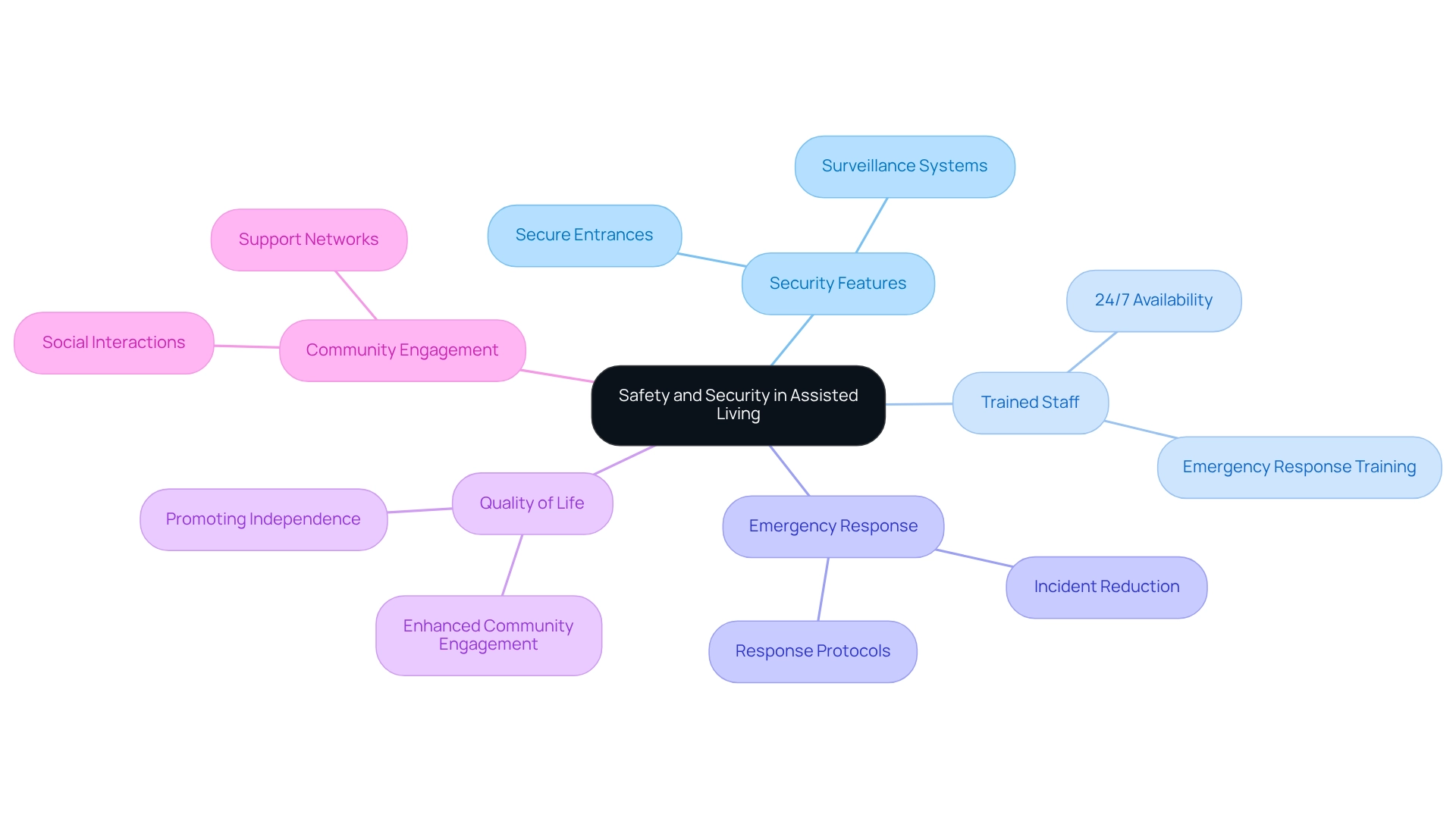
Community Support: Building Connections in Assisted Living Settings
Supportive housing settings that provide assisted living for autistic adults are designed to cultivate a vibrant sense of community among residents, which is particularly beneficial for individuals on the autism spectrum. By encouraging participation in group activities and events, these facilities help forge friendships and support networks. This communal environment is vital for emotional well-being, as it offers a strong support system that greatly improves residents' quality of life.
Research shows that engaging in community activities can enhance emotional health, fostering a sense of belonging and purpose. Moreover, staff in these settings are required to complete four hours of annual continuing education, ensuring they are well-equipped to provide care that nurtures these essential connections and fosters community building.
Case studies, such as 'A Sense of Togetherness,' showcase initiatives that effectively strengthen community ties, illustrating how a robust sense of togetherness can profoundly influence residents' experiences. As Richard J. Mouw eloquently puts it, 'An awareness of our ancestors gives us a sense of being part of a larger story,' a sentiment that resonates deeply within the realm of community support.
Ultimately, the focus on community support in assisted living for autistic adults not only enriches individual lives but also fosters a more inclusive and understanding environment for everyone. This reinforces the notion that community is crucial for maintaining friendships and nurturing a youthful spirit. Additionally, increasing awareness and promoting comprehensive mental health services can help create a supportive atmosphere that prioritizes the mental well-being of individuals on the spectrum.
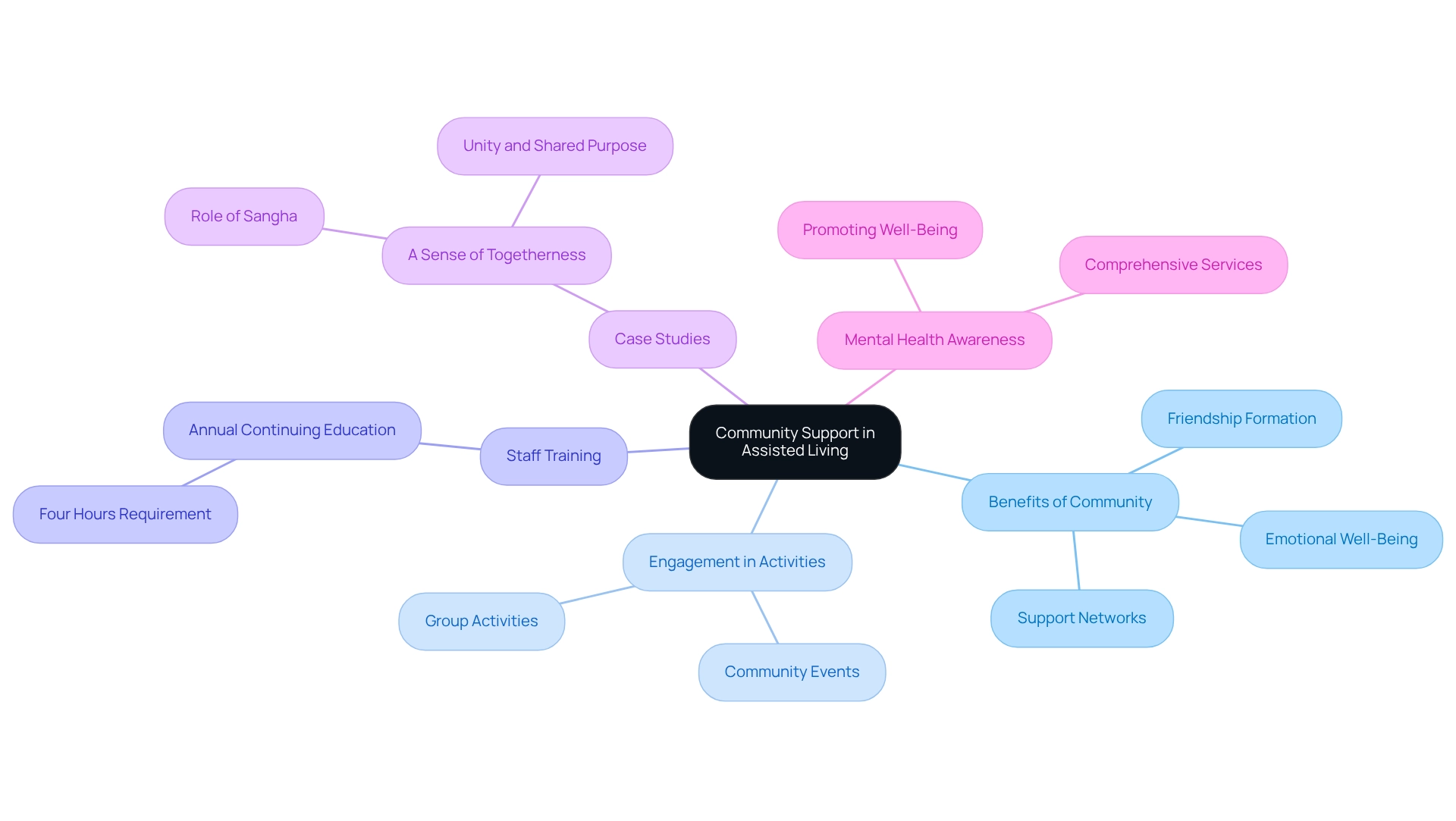
Recreational Activities: Promoting Well-Being in Assisted Living
Assisted living for autistic adults provides a variety of recreational activities designed to enhance the well-being of residents. These activities, which include arts and crafts, exercise classes, and outdoor excursions, are tailored to match the unique interests and abilities of each individual. By engaging in these recreational pursuits, residents not only improve their physical health but also experience vital social interaction and personal expression, both essential for emotional growth.
Statistics reveal that recreational therapy plays a significant role in enhancing the quality of life for individuals with autism. In fact, studies show that 75% of participants reported improved social skills and emotional well-being after taking part in structured recreational activities. Moreover, arts and crafts have a profound impact on overall well-being, providing therapeutic benefits that boost creativity and self-esteem.
As recreational therapist Jane Doe beautifully states, 'These activities are essential in fostering a supportive atmosphere where individuals on the spectrum can flourish, demonstrating their skills and reaching personal goals at their own speed.' Additionally, case studies highlight that residents involved in arts and crafts programs see a 60% increase in self-reported happiness and satisfaction. This underscores the importance of leisure activities in promoting independence and holistic development among individuals on the autism spectrum, which is crucial in assisted living for autistic adults. By exploring these enriching opportunities, you can help your loved ones thrive in a nurturing environment. Consider reaching out to local assisted living facilities to learn more about the programs they offer and how they can support your family's needs.
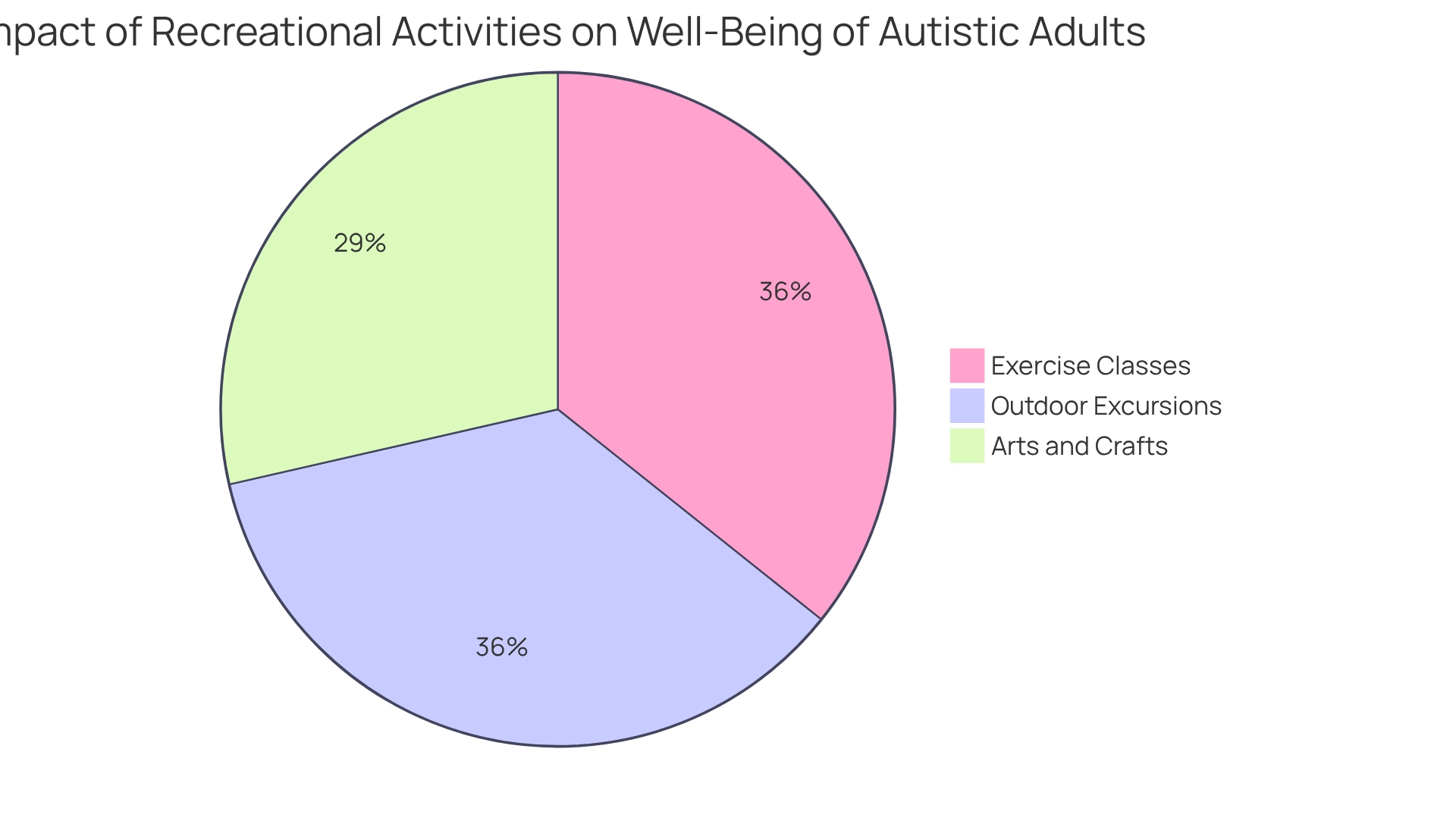
Transition Support: Easing the Move to Assisted Living for Autistic Adults
Transitioning to assisted living for autistic adults can be a pivotal moment for individuals on the autism spectrum, often accompanied by a range of emotions and challenges. To support this significant change, many facilities implement structured transition programs designed to ease residents into their new environment. These programs generally feature orientation sessions that help participants become familiar with the layout of the facility, introduce them to staff, and encourage interactions with fellow residents. Personalized tours can also play a crucial role, allowing individuals to explore their new home at their own pace, significantly reducing anxiety.
Research indicates that many autistic individuals have been out of high school for two to six years, highlighting the urgent need for effective transition support during this critical period. Experts emphasize the necessity for customized residential transition plans that align with the unique needs and preferences of young individuals in assisted living for autistic adults. Successful orientation programs have been shown to enhance adjustment by providing clear expectations and fostering a sense of belonging.
Case studies reveal that facilities prioritizing gradual introductions and ongoing support not only improve residents' comfort levels but also contribute to better long-term outcomes. As Paul T. Shattuck points out, further research is needed to determine methods for effectively executing residential transition plans that meet the needs and preferences of young individuals with ASDs and their families. Psychologists advocate for strategies that focus on facilitating transitions, indicating that a well-organized approach can greatly influence a person's adaptation to assisted care. Moreover, collaboration among families, organizations, and policymakers is essential in helping young individuals with autism address housing challenges. By fostering a supportive atmosphere, assisted living for autistic adults can help them navigate this transition more smoothly, ultimately enhancing their quality of life.
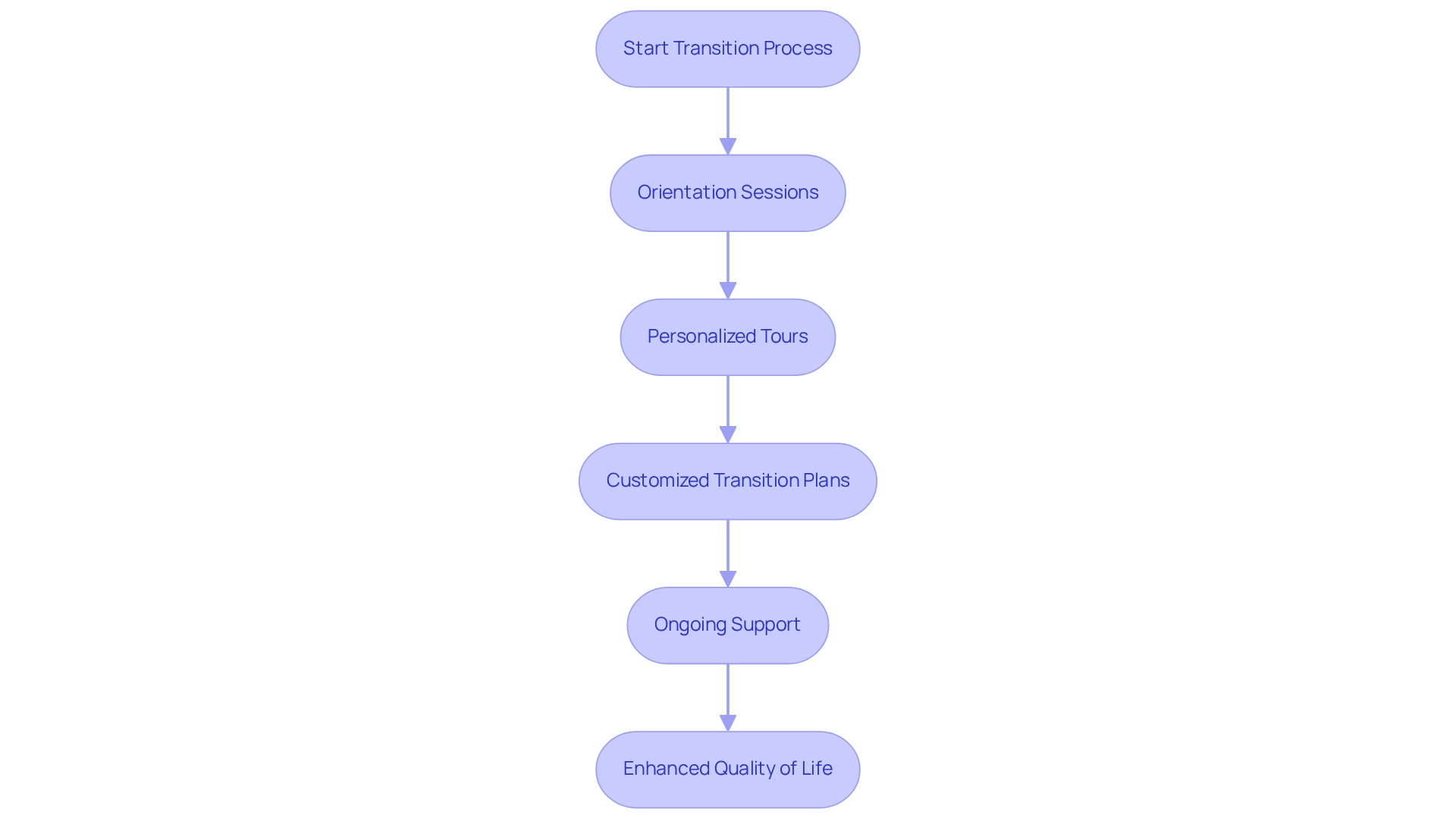
Holistic Care: Comprehensive Health and Well-Being in Assisted Living
Assisted care facilities are increasingly prioritizing holistic support, encompassing not only the physical health of residents but also their emotional and social well-being. This comprehensive approach includes access to essential healthcare services, mental health support, and opportunities for social engagement, all crucial for fostering independence and enhancing quality of life. Caregivers embody the spirit of heroism through their dedication, playing a vital role in this holistic care model.
Statistics reveal that essential life skills for independence—such as self-care, home living, money management, cooking, and nutrition—are integral components of this care model. Notably, only 19% of individuals with autism have achieved these skills, underscoring the importance of comprehensive support. By concentrating on the entire individual, these facilities ensure that individuals on the spectrum receive the diverse assistance they require to flourish in assisted living for autistic adults, ultimately resulting in enhanced outcomes and a more satisfying life.
Additionally, insights from case studies, such as 'Handling Emergencies in Home Care,' emphasize the importance of preparedness and proactive measures to manage potential emergencies, thereby enhancing safety in assisted living for autistic adults. Furthermore, understanding the services covered and excluded in the NHTD Waiver Program can provide parents with valuable context for seeking comprehensive care solutions, including assisted living for autistic adults. This understanding is vital as it empowers families to navigate the complexities of care, ensuring their loved ones receive the support they truly deserve.
Conclusion
Assisted living facilities play a vital role in supporting autistic adults by nurturing independence, enhancing social engagement, and providing personalized care. These environments are thoughtfully designed to empower residents through individualized care plans that cater to their unique needs, ensuring that each person can flourish while maintaining their autonomy. By addressing the specific challenges faced by autistic individuals, these facilities bridge the gap in essential services, fostering a structured approach that promotes self-esteem and personal growth.
The significance of community within assisted living cannot be emphasized enough. By encouraging social interactions and recreational activities, these environments cultivate a supportive atmosphere that helps combat isolation and loneliness. The sense of belonging nurtured in these settings greatly contributes to the emotional well-being of residents, reinforcing the notion that meaningful connections are essential for enhancing quality of life.
Financial considerations further highlight the advantages of assisted living. By consolidating services into a single monthly fee, families can ease some of the financial burdens associated with care, making these options more attainable. The focus on holistic care ensures that not only are physical health needs addressed, but emotional and social well-being are prioritized as well.
In conclusion, assisted living facilities represent a transformative choice for autistic adults, combining safety, community support, and personalized care to improve overall quality of life. By prioritizing independence and fostering connections, these environments empower individuals to navigate the complexities of daily life, ultimately leading to a more fulfilling and enriched existence. As society continues to recognize the diverse needs of autistic individuals, assisted living stands as a beacon of hope and support for families seeking the best for their loved ones.
Frequently Asked Questions
What is the commitment of ASD Media regarding Applied Behavior Analysis (ABA) therapy?
ASD Media is committed to advancing the implementation of ABA therapy by providing valuable insights and strategies to help families navigate challenges and improve outcomes.
What is the current prevalence of autism among children?
As of 2020, the prevalence of autism is 1 in 54 children.
Why is early intervention important in autism therapy?
Early and consistent interventions are crucial in effectively managing autism, as they generally lead to better long-term outcomes.
What resources does ASD Media provide for parents and professionals?
ASD Media offers a comprehensive array of resources tailored to unique situations, including access to the latest news and unlimited digital resources through their newsletter.
What challenges does ASD Media recognize in autism therapy?
ASD Media acknowledges challenges such as supply-demand discrepancies and racial disparities in autism therapy, which require collaboration among policymakers, healthcare providers, and communities.
How does ASD Media address gender disparities in autism diagnosis?
ASD Media emphasizes the necessity for customized programs that address gender disparities, ensuring that every child receives the support they deserve.
What benefits does assisted living provide for autistic adults?
Assisted living creates a nurturing environment that enhances independence by implementing personalized care plans, empowering residents to make informed choices about their daily activities.
What percentage of young individuals on the autism spectrum lack access to essential services?
Studies reveal that 26% of young individuals on the spectrum lack access to essential services such as employment and educational assistance.
How does maintaining psychophysical stability benefit individuals with autism?
Maintaining mental and physical wellness is vital for individuals with autism to handle daily tasks and responsibilities independently, helping them develop life skills and confidence in social interactions.
What role do social interactions play in assisted living for autistic adults?
Social interactions in assisted living foster a vibrant community, helping to alleviate feelings of isolation and loneliness, and enhancing overall quality of life through structured opportunities for engagement.
Why is social inclusion critical during adolescence and emerging adulthood for individuals with autism?
Social inclusion is essential during these developmental years as it significantly impacts the quality of life and emotional well-being of individuals with autism.




